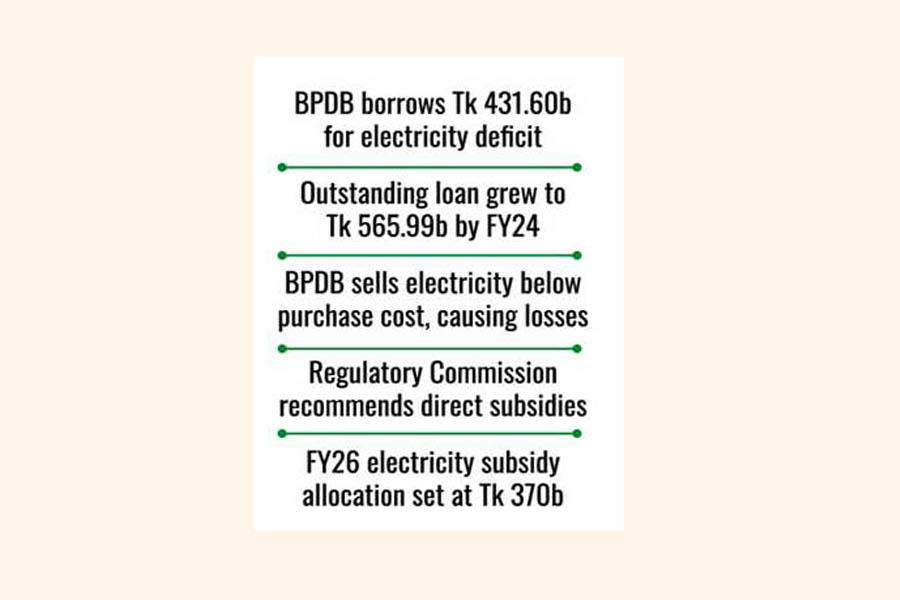
Published :
Updated :

The finance ministry has turned down a proposal from the Power Division under the Ministry of Power, Energy and Mineral Resources to convert the Bangladesh Power Development Board's (BPDB) outstanding loan of Tk 566 billion to a subsidy, citing excessive fiscal pressure, according to officials.
The Power Division recently urged the finance ministry to write off the massive loan, disbursed between July 2006 and November 2017, as subsidy support.
However, the finance ministry rejected the plea, arguing that the government is already under substantial pressure from year-on-year budgetary allocations for electricity subsidies.
According to official documents, the BPDB borrowed Tk 431.60 billion from the ministry over the years to cover its losses from purchasing electricity at high rates from rental, quick rental, and independent power producers (IPPs).
With a 3.0 per cent interest rate, the outstanding amount ballooned to Tk 565.99 billion by the end of FY24, including Tk 134.39 billion in accrued interest.
A senior official at the finance ministry told The Financial Express, "We have declined the Power
Division's request to convert BPDB's loan into a subsidy, as the public fund is already strained."
The BPDB has long incurred losses by selling electricity to consumers at rates significantly lower than the purchase cost from private producers.
A senior BPDB official noted that the now-ousted Sheikh Hasina government initially recorded the loans as budgetary support credit to mask the rising electricity subsidy on the balance sheet.
"Now, with persistent losses and no scope to repay the loan, the Power Division has formally requested its conversion into a full subsidy," the official added.
In 2017, the Bangladesh Energy Regulatory Commission recommended that the finance ministry provide direct subsidies to BPDB instead of further loans.
Since then, electricity subsidies have been included in the national budget.
For FY26, the government has allocated Tk 370 billion in electricity subsidies. In the revised budget for FY25, the subsidy stood at Tk620 billion.
Policy context
A Power Division official explained that government loans are usually recovered from returns on development projects, but the BPDB loans were meant solely to cover the gap between high electricity purchase costs and lower sale prices - not for capital investment.
"Since BPDB is a loss-making entity with no adequate revenue to repay the debt, the logical course would be to convert the loans into subsidies," the official argued.
In its letter to the finance ministry, the Power Division stated that cleaning up BPDB's financials through subsidy conversion was crucial to strengthening audit reports, improving the debt-to-equity ratio, and meeting donor agency expectations.
However, another finance ministry official warned that approving such a request could set a dangerous precedent.
"If we convert BPDB's loan into subsidy, other public agencies may cite it as a reference. This move is not justifiable at the moment," he said.
The financial woes of BPDB trace back to policy shifts that began in FY07 under the previous government, which initiated approvals for private sector power plants.
After 2009, the number of rental, quick rental, and IPP plants expanded significantly under special legislative provisions.
A report by the White Paper Preparation Committee, formed by the interim government, revealed significant financial irregularities in approving private power plants and determining capacity charges and electricity tariffs.
To curb rising subsidies, the current interim government has started renewing power purchase agreements on a "no electricity, no payment" basis.
Also, initiatives are underway to renegotiate existing contracts in order to reduce tariffs and minimise losses in the electricity sector.
kabirhumayan10@gmail.com


 For all latest news, follow The Financial Express Google News channel.
For all latest news, follow The Financial Express Google News channel.